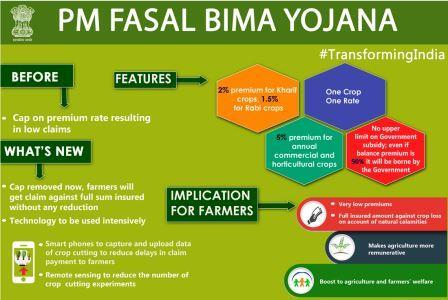Haryana: Dedicated to Farmers' Welfare | 21 Feb 2024
Why in News?
According to Governor Dattatreya, the government has always given top priority to the welfare and upliftment of the poor, farmers, youth and women.
Key Points
- The government is tirelessly working for the all-round, all-encompassing and inclusive development of the state based on education, health, security, self-reliance, self respect, service and good governance.
- Under the Pradhan Mantri Kisan Samman Nidhi Yojana, an amount of ₹4,157.73 crore has been directly deposited into the accounts of 19.94 lakh farmers of the state in the last four years.
- The state government has set a unique example by purchasing 14 crops at the Minimum Support Price (MSP).
- A sum of ₹90,000 crore has been directly deposited into the accounts of the farmers registered on the 'Meri Fasal Mera Byora' portal while ₹836.12 crore has been deposited into the bank accounts of the bajra producing farmers under the Bhavantar Bharpai Yojana.
- Under the Prime Minister Crop Insurance Scheme, claims worth about ₹8,178 crore have been given to 32.06 lakh farmers whose crops were damaged.
- The government has implemented the natural farming scheme to protect soil health from degradation and discourage the use of hazardous pesticides.
- Under the 'Mera Pani-Meri Virasat' scheme, a financial assistance of about ₹117.22 crore has been provided at the rate of ₹7,000 per acre for sowing alternative crops instead of paddy across 1.72 thousand acres of land.
- The governor said the farmers, who repay their loans on time, have been granted the facility of interest-free crop loans.
- The state government has notified the Haryana Ex-Situ Management of Paddy Straw Policy, 2023, to make stubble a source of income for the farmers and to protect the environment.
- This policy will focus on increasing private investment in straw-based projects and ensuring the use of straw by incentivizing the farmers.
- The target is to eliminate the problem of crop residue burning by 2027 under this policy.
- The government has gone beyond the individual identity card 'Aadhaar' and made a system of identification of the family in the form of 'Parivar Pehchan Patra', making it a medium to deliver benefits of government schemes to every family.
- Government has launched a strong campaign against corruption.
- In 2023, the Anti-Corruption Bureau registered 205 cases, conducted 152 raids and arrested 186 government employees, including 30 gazetted officers, 156 non-gazetted officers and 40 private persons.
- The governor said the government is making efforts to increase the number of women police personnel in the Haryana Police from 10 to 15%.
Parivar Pehchan Patra (PPP) Scheme
- The PPP scheme was formally launched in July 2019 to achieve Haryana government’s vision for ‘paperless’ and ‘faceless’ delivery of schemes, services and benefits offered by the state government.
- Under this, each family is considered a single unit and gets an 8-digit unique identification number, called family ID.
- Family IDs are also linked to independent schemes like scholarships, subsidies and pensions, so as to ensure consistency and reliability.
- It also enables automatic selection of beneficiaries of various schemes, subsidies and pensions.
- The primary objective of Parivar Pehchan Patra (PPP) is to create authentic, verified and reliable data of all families in Haryana.
Pradhan Mantri Kisan Samman Nidhi
- It was launched on 24th February, 2019 to supplement financial needs of land holding farmers.
- Financial benefit of Rs 6000/- per year in three equal installments, every four months is transferred into the bank accounts of farmers’ families across the country through Direct Benefit Transfer (DBT) mode.
- It is a Central Sector Scheme with 100% funding from the Government of India.
- It is being implemented by the Ministry of Agriculture and Farmers Welfare.
Pradhan Mantri Fasal Bima Yojana
- It was launched in 2016 and is being administered by the Ministry of Agriculture and Farmers Welfare.
- It replaced the National Agricultural Insurance Scheme (NAIS) and Modified National Agricultural Insurance Scheme (MNAIS).
- Farmers including sharecroppers and tenant farmers growing notified crops in the notified areas are eligible for coverage.

